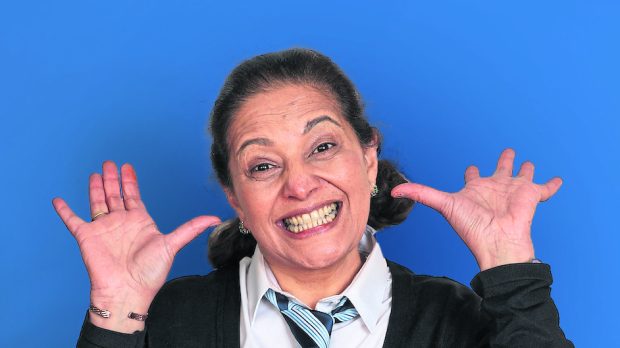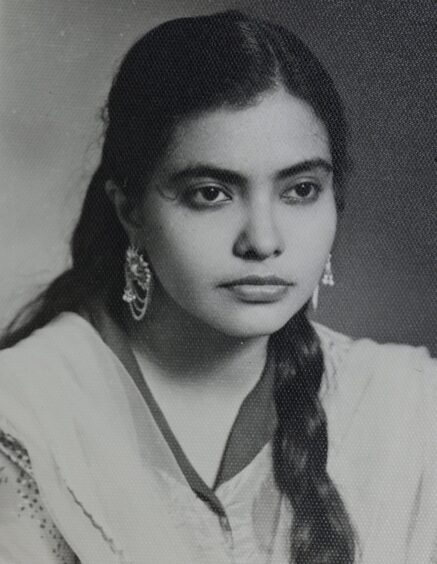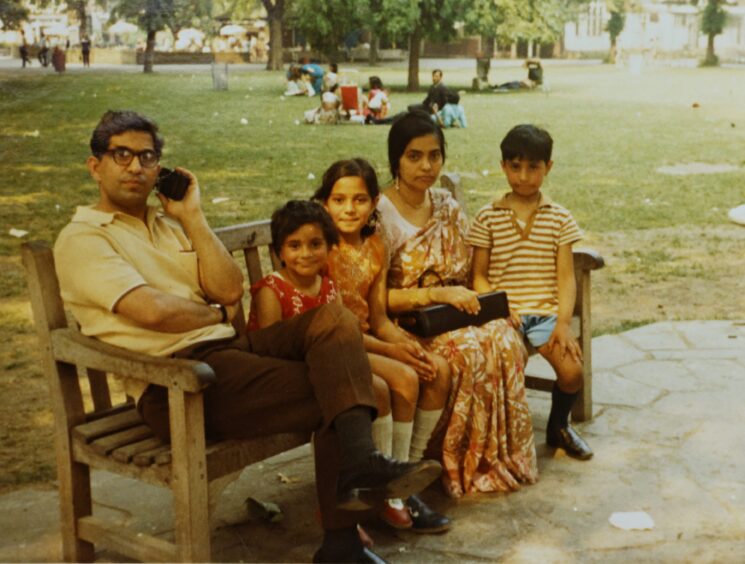
Lubna Kerr can still feel the sharp pain of the belt and the hot tingling sensation it left behind. She was in primary school, and her teacher wasn’t happy with her.
“I got the belt from Miss McDonald because I answered her back, after she accused me of cheating in an IQ test when I got a score of 145. She told me that brown people are stupid, as identified by the IQ test,” recalled Lubna, who was made to re-sit the test.
She scored 160 the second time.
“I was called all sorts of names and given labels at school,” she said.
Lubna had arrived in Glasgow in December 1965, when she was three-and-a-half. Her father, Ihsan, was an academic in Pakistan and was offered a scholarship to do a PhD in chemistry at Strathclyde University. It was a culture shock for all of them, especially young Lubna, who couldn’t speak English when she went to primary school.
“The teacher labelled me stupid because I couldn’t speak English. Teachers were horrible back then – quite vindictive, vicious bullies,” Lubna said. “I was put to the back of the class with the real idiots, who then picked on me because I wasn’t white. I had a lot of inappropriate words used towards me.”
Despite what her teachers and classmates thought, Lubna was far from stupid. She went on to earn a Masters and PhD as a pharmacist, and won a global award for her work in diabetes, travelling the world talking about her research. She later set up a centre for health and wellbeing to be preventative about issues like heart attacks.
She still works in medicine today, but she has also become a writer and actor. Her first one-woman play, Tickbox, has been a hit all around the UK over the past three years. It looked at her dad and mum, Mumtaz, and how they adapted after moving to Scotland.
The next part in her planned trilogy is Chatterbox, which examines Lubna’s school days and how labels given to children can stay with them and affect them later in life.
She continued: “I was always trying to prove I wasn’t what they said I was. I did feel stupid at primary school because I was told I was. I was very average, apart from the IQ test.
“I wanted to show I could do something. I enjoyed learning and didn’t let anything hold me back. If teachers said I couldn’t do something, I wanted to prove otherwise.
“I did enjoy primary school as well, though. There was a family of girls called the Wrens – Judith, Mandy and Susan – who I went to Brownies with. I remember going to Sanquhar for a week with the Brownies and my parents didn’t have a car, so the Wrens’ mum and dad brought my folks down midweek to see me.
“I still have fond memories of the Wrens. They moved to Aberdeen, and every so often I have a wee look for them online. When people are kind, you remember that kindness.”
It was in 2010, after her divorce and her three children had grown up, that Lubna decided she had time to follow her unfulfilled dream of becoming an actor.
She did a year-long course at Strathclyde University in theatre studies. “Coming into the theatre world as an older actor, you’re an outsider, even after 14 years of doing it, and I still feel I need to prove myself,” she said. “That’s the irony in this – I had to prove myself in primary school and I’m having to do so again now.”
One of Lubna’s objectives when first putting on Tickbox a few years ago was to bring in a diverse audience and have more people from an Asian background attending the theatre.
“That happened, 100%,” she said. “If you’ve not been before, there is a fear of the unknown, but then they come along and see someone they sort of know, and word spreads. Families would come to see it.
“I remember watching from the stage as some jokes landed with everyone, some landed with the Asians and not the whites, and some with the white people but not the Asian people. You could see them looking at each other, wondering why some were laughing at some of the jokes and others weren’t.
“I do workshops in advance with the community groups and engage with them to come and see it. I did the Dundee Fringe recently and on the first weekend there were a sprinkling of Asians in the audience, and in the second weekend it was full.”
Lubna says there will be a third part to the story, but first she’s looking forward to showcasing Chatterbox at the Edinburgh Fringe.
“I love talking, hence Chatterbox, and I love telling stories,” she added. “This is a positive story about overcoming the labels given to you, of overcoming adversity, and of following passions.”
Chatterbox, Pleasance Courtyard – The Green, July 31-Aug 25 (except 13, 20)

Enjoy the convenience of having The Sunday Post delivered as a digital ePaper straight to your smartphone, tablet or computer.
Subscribe for only £5.49 a month and enjoy all the benefits of the printed paper as a digital replica.
Subscribe
